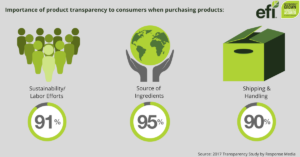 Studies show that many consumers, not just millennial moms, have been pushing for increased transparency among food brands, especially fresh food. This push is driven in part by fear and distrust, which is not surprising given the sheer number of food safety scares and labor scandals making headlines. The call for transparency is also driven by a desire for health and wellness and a demand for all-natural, chemical-free and organic products.
Studies show that many consumers, not just millennial moms, have been pushing for increased transparency among food brands, especially fresh food. This push is driven in part by fear and distrust, which is not surprising given the sheer number of food safety scares and labor scandals making headlines. The call for transparency is also driven by a desire for health and wellness and a demand for all-natural, chemical-free and organic products.
This “need to know” has extended beyond how and where food is grown or produced. According to a Response Media study, consumers are also seeking more information on the sustainable, charitable and labor practices of brands. That’s because shoppers are increasingly expecting companies to balance profits and good corporate citizenship.
In the digital era, it’s easy to assume that millennials are driving this change, especially since consumers are engaging more on social media, and according to predictive analytics firm IRI, posts about transparency are becoming much more prevalent and detailed. But the Response Media study points out that this “need to know” crosses all age groups, with 99 percent of respondents stating that transparency is important for their fresh food products (98 percent for packaged foods). What’s also important to note is that shopper purchases can be influenced by transparency content on packaging, and shoppers would even be willing to pay more for it.
“This desire for transparency didn’t happen suddenly. It built up over the years as labels like fair trade and organic, manufacturers like Stonyfield Farm and retailers like Whole Foods Market drew back the curtain on our modern food system. When shoppers saw what was behind all the canned, shrink-wrapped and packaged products they regularly buy, many had a hard time viewing their shopping experience the same way again,” stated Jeff Wells, editor of Food Dive.
 At Equitable Food Initiative, we partner with growers and retailers to create a more transparent food chain, safer food and healthier places to work. Our certification program is one of the most rigorous in the industry, bringing profound cultural shifts to farms and supports transforming farm labor via workforce development.
At Equitable Food Initiative, we partner with growers and retailers to create a more transparent food chain, safer food and healthier places to work. Our certification program is one of the most rigorous in the industry, bringing profound cultural shifts to farms and supports transforming farm labor via workforce development.
Among transparency issues, consumers are also concerned about labor practices, which is why social media conversations about fair food and wages increased 83 percent in 2017 over the previous year (IRI Social Advantage). Through the EFI Program, we train and support Leadership Teams on each farm. Leadership Teams engage the entire workforce, including managers, farmworkers and other staff, and foster a culture of collaboration to build trust, strengthen skills and promote problem-solving. As a result, our certified farms develop a deeper understanding of worker rights and worker voices, and knowledge becomes more valued, leading to an increase in worker self-esteem and more diligence in preventing food safety issues.
When consumers see the EFI label on fruits and vegetables, it means the grower is providing a new level of transparency that comes from having met all of our rigorous standards for labor practices, food safety and pest management. Labeling products is an essential step to engaging with consumers, as we’ve seen with the rapid growth of SmartLabel, a digital tool that enables consumers to access more detailed information on 28,000 products, up from 4,000 in early 2017.
According to Label Insight, manufacturers who adopt “complete transparency” would be rewarded with loyalty among 94 percent of consumers. This loyalty extends to choosing a supermarket, and retailers are taking notice. A report by the Food Marketing Institute shows that alternative formats more focused on transparency, including natural and organic retailers, online-only operators and club stores, are seeing increased consumer loyalty. According to FMI, factors most important to fresh food shoppers include health and wellness (65 percent), growth hormone- and antibiotic-free, pesticide- or fertilizer-free and non-GMO, as well as non-irradiated and more.
Here at EFI we encourage our grower partners to tell their stories, be open about how and where their food is grown and share their values—especially when it comes to improved labor practices, food safety, sustainability and charitable efforts. It’s time to restore consumer trust and change the conversation from fear to assurance and truth, which is what our Responsibly Grown, Farmworker Assured™ EFI-certified label represents.

